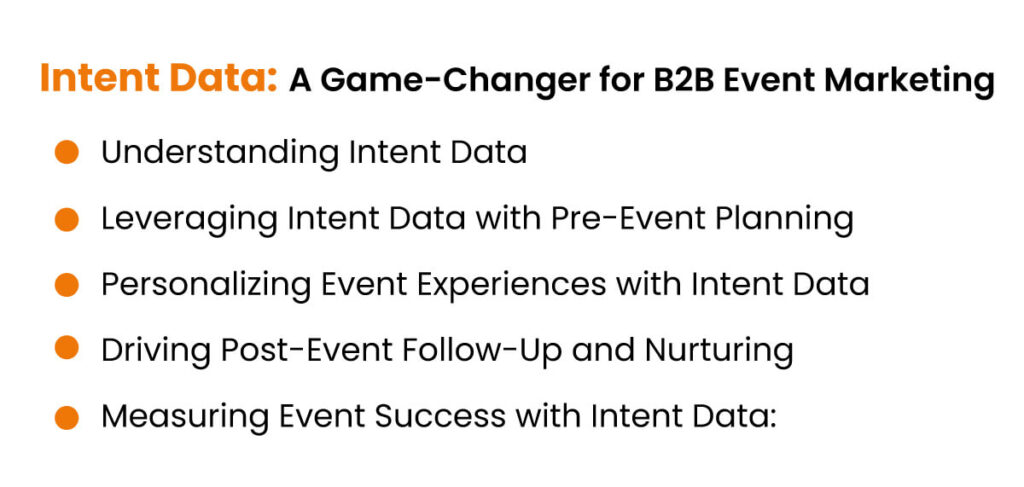B2B event marketing serves as a strategic approach for businesses to connect with their target audience, generate leads, and cultivate valuable relationships. To engage prospects and consumers, it requires planning and conducting events like conferences, trade exhibitions, and seminars. In the current digital era, data is essential to optimizing marketing tactics, and intent data has become a game-changer for B2B event marketing. In this blog, we will delve into the world of intent data and explore its relevance in enhancing event marketing effectiveness.
Table of Contents
Intent Data: A Game-Changer for B2B Event Marketing

Understanding Intent Data:
Intent data refers to the valuable information collected about individuals’ or companies’ behavior and actions, indicating their buying intent. It provides insights into the interests, preferences, and activities of potential event attendees. There are two main types of intent data: first-party intent data and third-party intent data. First-party intent data is gathered from your own digital channels, such as website interactions, email engagements, and content downloads. On the other hand, third-party intent data is obtained from external sources, offering a broader view of target audience behavior across various platforms and websites.
Must Read: Driving Growth with B2B Purchase Intent Data: Unlocking the Power of Buyer Insights
Leveraging Intent Data with Pre-Event Planning:
Pre-event planning is a critical phase where marketers aim to attract the right audience and generate maximum event attendance. Intent data plays a pivotal role in this stage by allowing marketers to identify and target individuals or companies showing active interest in relevant topics or solutions related to the event. By analyzing intent signals such as search queries, content consumption patterns, and social media interactions, event marketers can identify and engage with potential attendees who are actively researching or seeking information in their industry. This enables them to tailor their event messaging, content, and outreach efforts to resonate with the specific interests and needs of their target audience.
According to recent studies, leveraging intent data in pre-event planning can lead to significant improvements in event success. Companies that use intent data to target their event marketing efforts experience a 68% increase in event attendance rates compared to those who do not utilize intent data (Source: Bizzabo). Additionally, businesses that leverage intent data for event targeting and personalization achieve a 45% increase in lead conversion rates (Source: EverString). These statistics highlight the substantial impact of intent data on enhancing pre-event planning outcomes.
Must Read: B2B Intent Marketing: Capturing Business Leads
Personalizing Event Experiences with Intent Data:
Personalization is the key to creating memorable and impactful event experiences. With intent data, event marketers can gain deep insights into attendees’ preferences, needs, and pain points, enabling them to personalize event experiences at various touchpoints. By leveraging intent data, marketers can create customized event agendas, recommend relevant sessions or exhibitors based on attendees’ interests, and facilitate meaningful networking opportunities. Personalization based on intent data not only enhances attendee engagement and satisfaction but also increases the chances of post-event conversion and long-term customer loyalty.
According to research, personalization driven by intent data can lead to significant improvements in attendee satisfaction and engagement. Events that leverage intent data for personalization experience a 53% increase in attendee satisfaction rates (Source: Bizzabo). Moreover, personalized event experiences based on intent data result in a 47% increase in attendee engagement levels (Source: EverString). These statistics highlight the power of intent data in driving personalized event experiences that resonate with attendees and foster meaningful connections.
Must Read: Tips for Preventing Data Decay in B2B Sales
Driving Post-Event Follow-Up and Nurturing:
The end of an event is just the beginning of the post-event follow-up and nurturing process. Intent data plays a vital role in this phase by identifying and prioritizing leads based on their level of engagement and intent signals demonstrated during the event. By analyzing intent data, marketers can identify high-potential quality leads who exhibited strong buying signals, enabling them to tailor their post-event communications and follow-up strategies accordingly. This ensures that follow-up efforts are targeted, relevant, and personalized, maximizing the chances of converting leads into customers.
Research shows that businesses that leverage intent data for post-event follow-up and nurturing experience a 50% increase in lead conversion rates compared to those who do not utilize intent data (Source: EverString). Additionally, companies that incorporate intent data into their post-event nurturing strategies achieve a 45% increase in customer retention rates (Source: Bombora). These statistics demonstrate the significant impact of intent data in driving post-event success and nurturing valuable relationships with event attendees.
Must Read: MQL to SQL conversion rate
Measuring Event Success with Intent Data:
Measuring the success of B2B events is crucial for optimizing future event strategies and demonstrating return on investment (ROI). Intent data provides valuable metrics and insights to evaluate the effectiveness and impact of events. By analyzing intent signals and correlating them with event outcomes such as lead generation, pipeline acceleration, and revenue attribution, event marketers can gain a comprehensive understanding of the event’s impact on business goals.
Recent studies indicate that businesses that leverage intent data for measuring event success achieve a 43% increase in event ROI compared to those who do not utilize intent data (Source: EverString). Moreover, companies that incorporate intent data into their event measurement and analysis efforts experience a 35% increase in marketing-qualified leads (MQLs) (Source: TOPO). These statistics emphasize the importance of intent data in measuring event success accurately and making data-driven decisions to refine future event planning and execution.
Future Trends and Opportunities:
The use of intent data in B2B event marketing is anticipated to change and open new possibilities as technology develops. Future trends include the integration of intent data with marketing automation and customer relationship management (CRM) platforms, advanced predictive analytics for spotting trends and patterns in intent data, and the application of artificial intelligence (AI) and machine learning to improve the accuracy and efficiency of intent data analysis. These developments will let event marketers understand attendee behaviors more thoroughly, personalize content more effectively, and tweak event strategy for even better outcomes.
Additionally, the future of intent data utilization will be shaped by the increasing significance of privacy rules, such as the General Data Protection Regulation (GDPR) and the California Consumer Privacy Act (CCPA). Marketers will need to ensure compliance and prioritize transparency and consent when collecting and using intent data.
Opportunities abound for event marketers who leverage intent data effectively. They can identify untapped market segments, uncover new customer needs and preferences, and refine their event strategies based on data-driven insights. By harnessing the power of intent data, businesses can drive higher event attendance, increase lead quality, improve attendee engagement, and ultimately achieve greater event success.
Must Read: A Guide to Using Intent Data in Your ABM Program
Conclusion:
Intent data has revolutionized the landscape of B2B event marketing, offering valuable insights and opportunities for marketers to enhance personalization, improve efficiency, and drive better results. By leveraging intent data throughout the event marketing journey, from pre-event planning to post-event follow-up, marketers can identify high-potential attendees, personalize event experiences, nurture leads effectively, and measure the true impact of their events.
As intent data continues to evolve and technology advances, it will play an increasingly integral role in shaping the future of B2B event marketing. Marketers who embrace intent data and adapt their strategies accordingly will be at the forefront of driving meaningful connections, delivering impactful experiences, and achieving remarkable event success.

Vikas Bhatt is the Co-Founder of ONLY B2B, a premium B2B lead generation company that specializes in helping businesses achieve their growth objectives through targeted marketing & sales campaigns. With 10+ years of experience in the industry, Vikas has a deep understanding of the challenges faced by businesses today and has developed a unique approach to lead generation that has helped clients across a range of industries around the globe. As a thought leader in the B2B marketing community, ONLY B2B specializes in demand generation, content syndication, database services and more.





